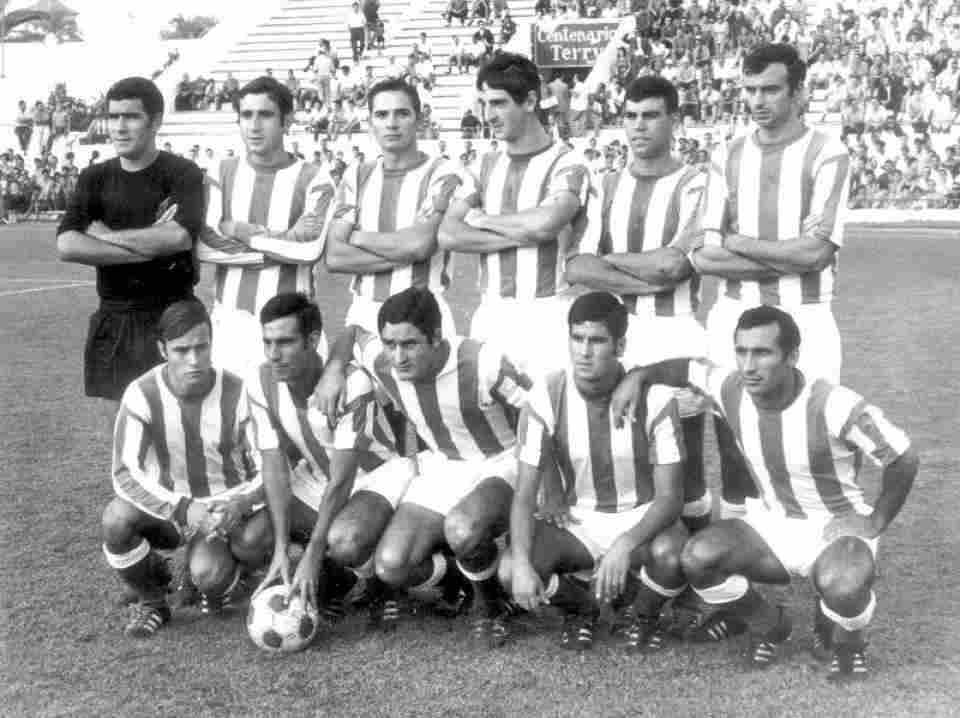
HISTORY / Dioni came off and Landa came on
Substitutions during a match were introduced in 1969 and Betis used the new rule for the first time against Real Sporting de Gijon in the first match of the season
By Manolo Rodríguez
This season, as it always happen, football rules include some changes that try to make it fairer, more dynamic and more attractive. Things that are always welcome.
This time, the International Board (international organism made up by the four associations in the United Kingdom and the FIFA, and that ius in charge of defining the rules and regulations in world football since 1866) has focused this time on the hands, the structures of the walls in free kicks, goal kicks, yellow cards for coaches, drop balls, and the influence that the ball hitting the referee could have.
Changes that are, without a doubt, important but perhaps cannot be considered as transcendental. They will improve some aspects of the game, will balance some others and, hopefully, will help the referees. But they will not change much else.
Something that is completely different to what happened at the beginning of the season 1969/1970, 50 years from now, when the International Board allowed teams to make two player substitutions during a match. A measure that had a big impact and that brought along a new football in which more actors could take the stage, the call-ups could include more players and that gave coaches the chance to increase the tactic variations because that could change the setting by bringing on a certain player.
Until that moment, in Spain it was only allowed to substitute the goalkeeper if he got injured, and this measure change everything. If was so successful that in 1994-95, the number of changes was increased up to two substitutions plus the keeper. A season later, the rule changed again and three substitutions were allowed, regardless of if it was the goalkeeper or not. At the same time, other modern measures were introduced, such as the three points per victory, fix numbers for the players, and an increase in the number of foreign players who play for a team.
But the beginning of so many new things, as we were saying, occurred in the Summer of 1969. Back then, Real Betis played in Second Division.
As it is natural, the only target was the promotion, but not the only emergency. Banks were pushing the Club because of the debt that followed the purchase of the Stadium in 1961, and Betis president, José Naranjo Núñez, was focused on the negotiations with the banks.
In sporting terms, a new coach had arrived. Miguel González was at the helm after training Atletico de Madrid the previous season. A well-known name in Spain because of his legendary past as an Atletico player. A fast winger who was part of an outstanding generation in the Spanish national team with big names such as Kubala, DI Stéfano, Luis Suárez or Gento.
The team began the trainings on the 23rd of July and not a month had gone by when the first crisis came. Quino, who was looking for a contract improvement, decided not to travel to Cordoba to play the Montilla-Moriles trophy, where the Green and Whites beat Wiener Sport from Austria and lost in the final against Sporting Lisbon.
On Tuesday the 2nd of September, a tribute match in memory of Quico Grau, former Betis player, took place and Quino returned to the team. He had talked to the board and the great striker scored two goals. The Green and Whites won 5-4 against Portuguesa from Brazil, but Quino got injured in his elbow.
Such an unfortunate event made impossible for Quino to play in the league debut to be played four days later. The first one in which two changes were allowed. The rival was Sporting de Gijon, a great team that eventually won the Second Division that year. Sporting were trained by Luis Carriega (who later became a successful coach for Betis) and that evening Enrique Castro 'Quini', one of the best strikers in the history of Spain, made his debut.
The kick off was at Villamarín on Saturday the 6th of September of 1969 at 6 p.m. These were the line-ups:
Real Betis: Villanova, Telechía, Díaz, Cobo, Mellado, Frigols, Santi, Dioni, González, Nolito, Macario.
Sporting de Gijon: Castro, Echevarría, Alonso, De la Fuente, Puente, Herrero I, Herrero II, Quini, Paquito, Valdés, Churruca.
Betis were missing Quino and Rogelio, both injured, and that was too much. But things started well. Macario scored after two minutes and the optimism grew in the stands. It was an illusion because Quini tied the game after half an hour. From that moment, Sporting controlled the game.
The first substitution in the match, the one who opened and era, was made by the team from Asturias. In the 28th minute, Herrero I got injured and was replaced by José Manuel. And also the second, Valdés had to leave, also injured, and Salazar came on.
Betis, on their part, took their time. Miguel thought about it until twenty minutes before the end. Then, Dioni was subbed off and Jesús Landa, a good striker, came on.
Landa came on with the 14 on his back and fought for each ball. But the goal did not arrive and the game ended in a draw. It was the beginning of a season that ended by falling two points short from the promotion. Coach Miguel was sacked after 10 games.
The fans had to wait another year to watch their team again in the top division, but that Septmeber evening left the first field player change in the history of Real Betis.





